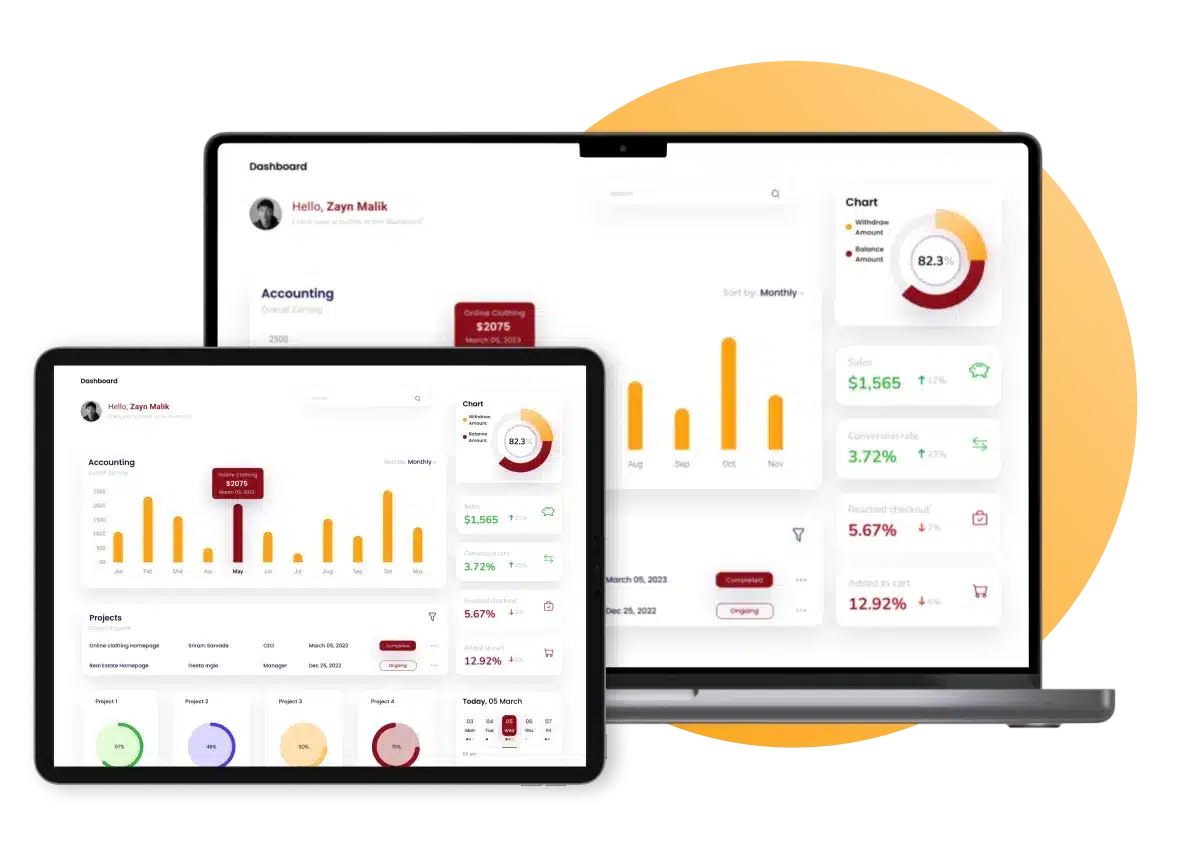In today’s fast-paced business environment, managing CRM system customer relationships efficiently is crucial for success. Without a proper system, businesses often struggle with scattered customer data, missed follow-ups, and inconsistent communication. These inefficiencies lead to lost sales opportunities and declining customer satisfaction.
Studies show that businesses using CRM system experience a 41% increase in sales productivity, making CRM a game-changer for modern companies. Whether you operate a retail business, a service-based company, or a large enterprise in Malaysia, a CRM system helps centralize customer information, automate workflows, and improve collaboration across teams.
This article explores what a CRM system is, how it works, and why it is essential for businesses in Malaysia. If you want to streamline sales, enhance customer service, and boost revenue, implementing a CRM system is the next step.
Key Takeaways
|
Table of Content
Content Lists

What is a CRM System?
A Customer Relationship Management (CRM) system is a software tool that helps businesses manage customer interactions, streamline sales processes, and improve customer service. It serves as a centralized hub that consolidates customer data, automates tasks, and enhances collaboration across teams.
With increasing competition and evolving customer expectations, adopting a structured CRM system is no longer optional—it’s essential. By leveraging CRM software, businesses can efficiently track leads, personalize marketing efforts, and build stronger relationships with customers. This leads to increased sales, better customer retention, and overall operational efficiency.
Why CRM is Essential for Businesses in Malaysia

CRM adoption has grown rapidly as businesses recognize its role in improving customer engagement and sales performance. Research shows that companies that implement CRM systems can achieve up to a 41% increase in sales productivity.
For Malaysian businesses, CRM software is particularly valuable in handling a diverse customer base across industries like retail, finance, and manufacturing. It helps businesses manage customer inquiries, track purchase behaviors, and deliver personalized experiences, ensuring stronger brand loyalty.
Additionally, CRM software enhances regulatory compliance by securely storing customer data, ensuring businesses adhere to Malaysia’s data protection laws. By implementing a CRM system, businesses in Malaysia can stay competitive, improve efficiency, and drive sustainable growth.
Who Needs a CRM System?
CRM systems are essential for businesses that handle large volumes of customer interactions, sales leads, and support requests. While small businesses can benefit from basic CRM tools, mid-sized and large enterprises in Malaysia often require more advanced CRM solutions to manage complex customer relationships.
Companies in industries such as retail, financial services, manufacturing, and real estate rely on CRM software to track leads, monitor sales pipelines, and automate communication. Without a structured CRM system, businesses may struggle with scattered customer data, inconsistent follow-ups, and missed opportunities.
For growing businesses, CRM software improves workflow efficiency, ensuring that sales teams, marketing teams, and customer service representatives work cohesively. Whether managing online or offline interactions, CRM helps businesses convert leads into loyal customers, boost sales, and enhance overall customer satisfaction.
Types of CRM Systems
Understanding the different types of CRM systems can help businesses choose the right one based on their needs. Here are the four main types of CRM software:
- Operational CRM – Focuses on automating daily sales, marketing, and customer service tasks. It improves efficiency by reducing manual work and organizing customer interactions.
- Analytical CRM – Helps businesses analyze customer data and sales trends. This CRM type is valuable for companies that rely on data-driven decision-making to refine marketing strategies and personalize customer experiences.
- Collaborative CRM – Enhances communication between departments by centralizing customer data. It ensures that marketing, sales, and support teams work together efficiently to provide seamless customer service.
- Strategic CRM – Focuses on long-term customer relationship management by aligning business goals with customer needs. This CRM type helps companies improve customer loyalty and retention over time.
Choosing the right CRM system depends on your business structure and operational goals. For Malaysian companies, an integrated CRM solution ensures better customer insights, improves efficiency, and streamlines business processes.
Key Features of a CRM System
A CRM system provides essential tools to streamline customer interactions, enhance productivity, and optimize business operations. Below are some key features businesses should look for:
- Contact Management – Stores and organizes customer details, such as names, addresses, and communication history, ensuring businesses have a centralized database for all interactions.
- Interaction Tracking – Keeps records of customer interactions across multiple channels, helping sales teams maintain personalized communication and follow-ups.
- Lead Management – Tracks leads through the sales funnel, from the initial inquiry to conversion, allowing businesses to nurture potential customers efficiently.
- Email Integration – Connects email platforms to the CRM system, making communication smoother by enabling automated responses and scheduled email campaigns.
- Quotation & Proposal Management – Helps businesses create, send, and track sales proposals or quotations, ensuring better deal management.
- Sales Pipeline Management – Provides a visual overview of ongoing deals, allowing teams to monitor progress and strategize the next steps in closing sales.
- Workflow Automation – Reduces manual tasks by automating follow-ups, reminders, and approvals, helping businesses increase productivity and minimize errors.
A robust CRM system should offer these core features while also integrating with other essential business tools, such as ERP and marketing automation software, to provide a seamless experience.
Benefits of CRM
Implementing a CRM system offers multiple benefits that drive business growth and efficiency. Here’s how businesses can gain from using CRM software:
- Boosted Sales Productivity – CRM systems help sales teams organize customer data, track leads, and close deals faster, improving sales performance.
- Better Customer Insights – A centralized database enables businesses to analyze customer behavior, track preferences, and deliver more personalized experiences.
- Automated Workflows – Repetitive tasks like follow-ups and data entry are automated, allowing teams to focus on higher-value activities.
- Improved Collaboration – CRM tools bridge communication gaps between departments, ensuring seamless coordination between marketing, sales, and customer support teams.
- Enhanced Customer Retention – Businesses can anticipate customer needs, provide timely support, and foster loyalty by maintaining strong customer relationships.
- Data-Driven Decisions – CRM software provides real-time analytics and performance metrics, enabling businesses to make informed strategic choices.
- Scalability – As businesses grow, CRM systems adapt by offering customizable features and integrations, ensuring continuous efficiency and effectiveness.
By implementing the right CRM software in Malaysia, businesses can enhance productivity, improve customer engagement, and ultimately drive revenue growth.
HashMicro: The Best CRM Solution for Your Business

HashMicro is a leading ERP and CRM provider in Southeast Asia, offering an advanced CRM system tailored to businesses in Malaysia. With a strong presence in the region, HashMicro supports enterprises by providing comprehensive CRM solutions that help businesses streamline sales, enhance customer relationships, and improve operational efficiency.
Unlike generic CRM tools, HashMicro’s CRM software is designed to align with business needs, integrating sales automation, customer data management, and advanced analytics in a single platform. This ensures businesses can manage leads, track interactions, and optimize marketing strategies seamlessly. Why choose HashMicro CRM?
- Sales Pipeline Management – Track deals through every stage of the sales funnel and identify high-priority prospects.
- Lead Tracking & Nurturing – Automate follow-ups and personalize interactions to improve lead conversion rates.
- Revenue Forecasting – Use AI-powered analytics to predict sales performance and optimize business strategies.
- Integrated Email Marketing – Manage campaigns, automate email responses, and monitor customer engagement within the CRM system.
- Call Logging & Sales Reports – Keep track of conversations, sales activities, and team performance in real time.
- Seamless ERP Integration – Connect CRM with other business functions, such as inventory, accounting, and procurement, for a unified system.
By choosing HashMicro’s CRM software, businesses can gain a scalable and customizable solution that enhances customer engagement, sales efficiency, and decision-making.
Conclusion
A Customer Relationship Management (CRM) system is an essential tool for businesses that want to improve customer engagement, streamline sales, and make data-driven decisions. Whether you run a growing business or a large enterprise, a well-implemented CRM system provides a competitive edge by optimizing operations and enhancing customer experiences.
With the right CRM software, companies can automate workflows, improve collaboration, and strengthen relationships with both existing and potential customers. As businesses in Malaysia continue to embrace digital transformation, investing in an effective CRM system is crucial for sustainable growth and long-term success.
HashMicro’s CRM software is designed to help businesses manage sales pipelines, nurture leads, and improve customer retention effortlessly. Whether you need AI-driven insights, seamless integrations, or automated processes, HashMicro provides a tailored CRM solution for businesses in Malaysia. Get started today—request a free demo and discover how HashMicro’s CRM can transform your business!

FAQ about CRM System
-
What does CRM mean?
CRM stands for Customer Relationship Management, a system that helps businesses manage interactions with customers, streamline sales processes, and improve customer retention.
-
What is an example of CRM software?
CRM software examples include sales tracking, lead management, and customer engagement tools. HashMicro’s CRM offers all these features, making it an ideal solution for businesses looking to optimize customer relationships.
-
Which CRM is the best in Malaysia?
The best CRM system depends on a business’s specific needs. HashMicro CRM is one of Malaysia’s top choices, offering comprehensive features, AI-driven analytics, and seamless ERP integration to help businesses grow efficiently.































